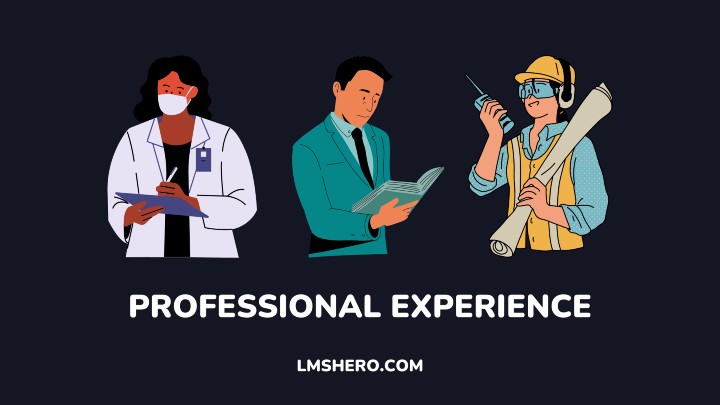While professional experience is sometimes used synonymously with work history, they are not quite the same thing.
Learn what having professional experience means in this article, its importance, and some of the benefits of having professional expertise.
What is professional experience?
Professional experience is defined as the experience acquired via a full-time job in an area connected to schooling. You can also define it as expertise in an area in which you have obtained a license.

It also refers to your proficiency and effectiveness in doing the tasks associated with your particular professional expertise. Such expertise is acquired over a given period or years.
To determine rank at an initial appointment, the requirement for academic experience may be disregarded. Your professional background will be assessed in light of relevant job descriptions at your current rank or level of expertise.
What does it mean to have professional experience?
The meaning of professional experience is having a history of employment in your area of expertise.
In other words, if you majored in real estate management in college and worked as a realtor for five years, you have five years of professional experience.
It’s crucial to distinguish between “professional” and “regular” experience. This is because getting paid to accomplish a task suggests that you did it well enough that someone was willing to pay.
This means that the clients were presumably satisfied with your work enough to keep you in service. Additionally, related work experience should not be regarded as professional experience.
For instance, as a volunteer, you spent years helping with services such as house painting, yard work, cleaning, and other volunteer activities.
That’s admirable and would demonstrate your desire to “go the additional mile” to a potential employer. However, that does not qualify you to work as a professional painter.
A professional would be someone who has received payments for years in all aspects of commercial painting.
Is work history the same as professional experience?
While there aren’t many differences, professional experience and work history are not the same things.
Work history would refer to past work experience regardless of the field while professional experience would be relevant work experience in a certain area of specialty.
How do you list your professional background in a resume?
An experience section with a chronological arrangement is one way to showcase your work background on a resume. This approach is great when you have extensive experience in a single industry.
By using this strategy, a hiring manager is able to track your professional development and evaluate how your skills have evolved as you’ve progressed.
Consider the scenario where you began your career as a journalist. You describe your duties in this position and how they helped you develop your expertise in the sector of media/journalism services.
For example, you describe that after working for a TV station for a few years, you were promoted to a junior reporter position at the same station, where you gained more experience covering breaking news in person.
Over time, you were elevated to the position of lead anchor, given control over your own program, and the freedom to direct your shows.
How many years of working is considered professional experience?
Two years is a reasonable amount of time to build contacts and gain professional expertise. Additionally, it offers you a variety of employment privileges that improve your ability to bargain for a promotion.
Frequently, a box labeled “years of professional experience” would appear on a job application to fill a more specialized role. The simple answer to this question is how long you have worked in a position that is either extremely similar to or identical to this one.
For instance, if you were looking for a teaching job, teaching youngsters in your community as a volunteer would not be seen as professional expertise.
Instead, independent of the class grades taught, “professional experience years” refers to the length of time spent working as a teacher in another institution.
Importance of professional experience
Having a professional background is crucial for landing a job in your field of expertise. Possessing experience very similar to that role can also help you stand out from the competition when you apply for employment, training programs, and courses.
Through professional growth, employees will also improve as workers. Employees will be more effective and productive by developing the proper skills for their careers, which will benefit the company for which they work.
Finally, employees may be able to access new opportunities through professional development.
What are the advantages of professional experience?
Your professional background will help you comprehend your new working environment and the standards that businesses have for their employees.
It is also an opportunity to investigate potential career paths as independence, maturity, and self-confidence are all improved.
Other benefits of having a professional background include;
- Increased desire to continue learning and/or pursuing new endeavors
- It can be easier to prepare younger recruits for work if you have a deeper understanding of how the job is performed.
- More possibilities to learn skills and develop work-related competencies
FAQs
Can professional experience be gotten through education?
Yes, in some instances professional expertise can be acquired through education.
Employers sometimes consider completing a relevant course to be similar to having real work experience.
What is the required professional experience of a teacher?
A thorough understanding of instructional techniques, good written and verbal communication skills, and a thorough understanding of legal education procedures.
How can students get professional experience?
Students can acquire professional expertise through volunteer jobs, internships, job shadowing, or research positions among other methods.
Conclusion
Having professional experience relates to having acquired expertise in your field of specialty. This can range from being a mechanic to a surgeon, painter, teacher, or data analyst.
Unlike work history that transfers interpersonal skills from unrelated jobs, professional expertise usually requires that you have working knowledge in that particular field that spans years.
I hope you found this article helpful. You can also learn more about relevant work experience and how it differs from professional experience.
Thanks for reading.







